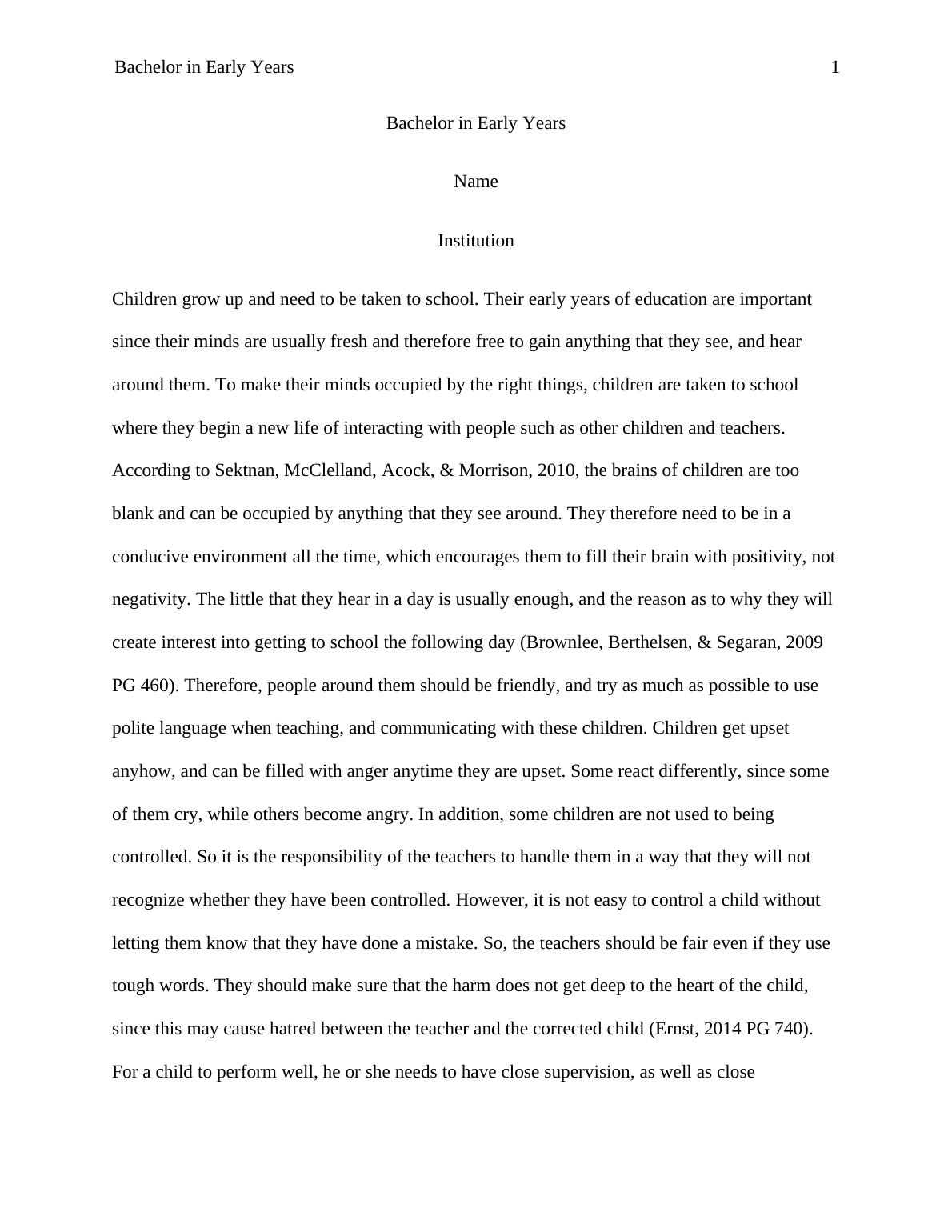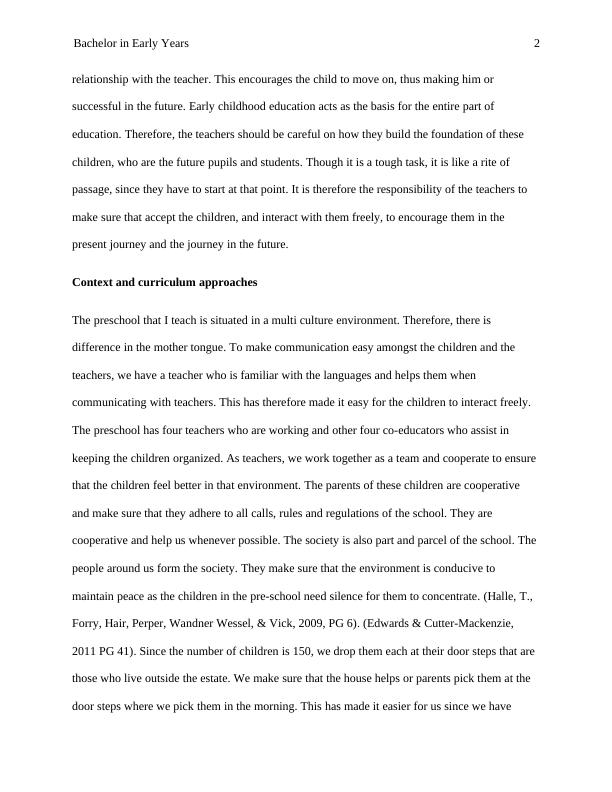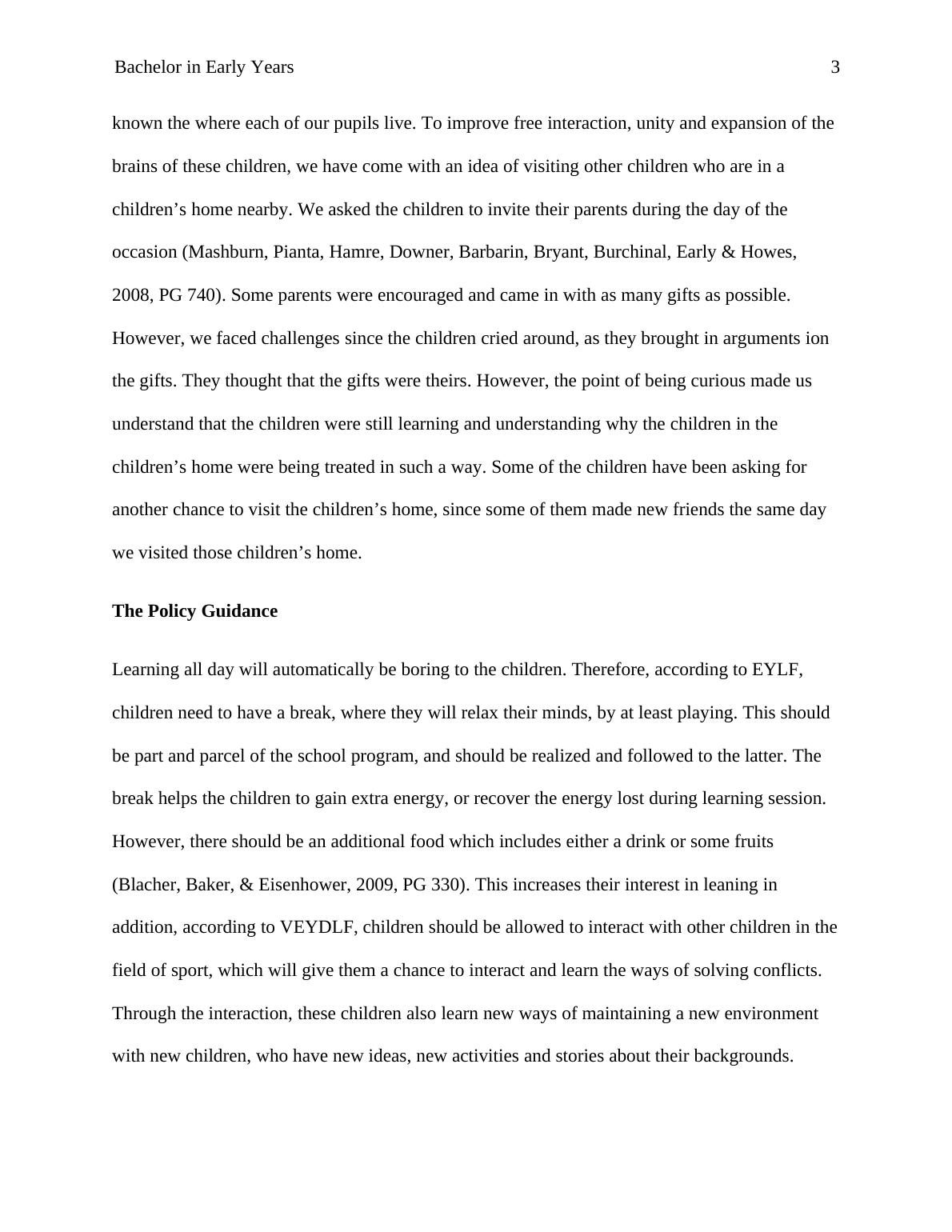Ask a question from expert
Bachelor in Early Years - Doc
10 Pages3317 Words255 Views
Added on 2021-05-31
Bachelor in Early Years - Doc
Added on 2021-05-31
BookmarkShareRelated Documents
Bachelor in Early Years 1Bachelor in Early YearsNameInstitutionChildren grow up and need to be taken to school. Their early years of education are important since their minds are usually fresh and therefore free to gain anything that they see, and hear around them. To make their minds occupied by the right things, children are taken to school where they begin a new life of interacting with people such as other children and teachers. According to Sektnan, McClelland, Acock, & Morrison, 2010, the brains of children are too blank and can be occupied by anything that they see around. They therefore need to be in a conducive environment all the time, which encourages them to fill their brain with positivity, notnegativity. The little that they hear in a day is usually enough, and the reason as to why they will create interest into getting to school the following day (Brownlee, Berthelsen, & Segaran, 2009 PG 460). Therefore, people around them should be friendly, and try as much as possible to use polite language when teaching, and communicating with these children. Children get upset anyhow, and can be filled with anger anytime they are upset. Some react differently, since some of them cry, while others become angry. In addition, some children are not used to being controlled. So it is the responsibility of the teachers to handle them in a way that they will not recognize whether they have been controlled. However, it is not easy to control a child without letting them know that they have done a mistake. So, the teachers should be fair even if they use tough words. They should make sure that the harm does not get deep to the heart of the child, since this may cause hatred between the teacher and the corrected child (Ernst, 2014 PG 740). For a child to perform well, he or she needs to have close supervision, as well as close

Bachelor in Early Years 2relationship with the teacher. This encourages the child to move on, thus making him or successful in the future. Early childhood education acts as the basis for the entire part of education. Therefore, the teachers should be careful on how they build the foundation of these children, who are the future pupils and students. Though it is a tough task, it is like a rite of passage, since they have to start at that point. It is therefore the responsibility of the teachers to make sure that accept the children, and interact with them freely, to encourage them in the present journey and the journey in the future.Context and curriculum approachesThe preschool that I teach is situated in a multi culture environment. Therefore, there is difference in the mother tongue. To make communication easy amongst the children and the teachers, we have a teacher who is familiar with the languages and helps them when communicating with teachers. This has therefore made it easy for the children to interact freely. The preschool has four teachers who are working and other four co-educators who assist in keeping the children organized. As teachers, we work together as a team and cooperate to ensure that the children feel better in that environment. The parents of these children are cooperative and make sure that they adhere to all calls, rules and regulations of the school. They are cooperative and help us whenever possible. The society is also part and parcel of the school. The people around us form the society. They make sure that the environment is conducive to maintain peace as the children in the pre-school need silence for them to concentrate. (Halle, T., Forry, Hair, Perper, Wandner Wessel, & Vick, 2009, PG 6). (Edwards & Cutter-Mackenzie, 2011 PG 41). Since the number of children is 150, we drop them each at their door steps that are those who live outside the estate. We make sure that the house helps or parents pick them at the door steps where we pick them in the morning. This has made it easier for us since we have

Bachelor in Early Years 3known the where each of our pupils live. To improve free interaction, unity and expansion of the brains of these children, we have come with an idea of visiting other children who are in a children’s home nearby. We asked the children to invite their parents during the day of the occasion (Mashburn, Pianta, Hamre, Downer, Barbarin, Bryant, Burchinal, Early & Howes, 2008, PG 740). Some parents were encouraged and came in with as many gifts as possible. However, we faced challenges since the children cried around, as they brought in arguments ion the gifts. They thought that the gifts were theirs. However, the point of being curious made us understand that the children were still learning and understanding why the children in the children’s home were being treated in such a way. Some of the children have been asking for another chance to visit the children’s home, since some of them made new friends the same day we visited those children’s home.The Policy GuidanceLearning all day will automatically be boring to the children. Therefore, according to EYLF, children need to have a break, where they will relax their minds, by at least playing. This should be part and parcel of the school program, and should be realized and followed to the latter. The break helps the children to gain extra energy, or recover the energy lost during learning session. However, there should be an additional food which includes either a drink or some fruits(Blacher, Baker, & Eisenhower, 2009, PG 330). This increases their interest in leaning in addition, according to VEYDLF, children should be allowed to interact with other children in thefield of sport, which will give them a chance to interact and learn the ways of solving conflicts. Through the interaction, these children also learn new ways of maintaining a new environment with new children, who have new ideas, new activities and stories about their backgrounds.

End of preview
Want to access all the pages? Upload your documents or become a member.
Related Documents
Enhancing Literacy and Language Development in Preschool Childrenlg...
|9
|2550
|239
Graduate Diploma in Early Childhood Educationlg...
|9
|1874
|14
Cover Letter, Curriculum Vitae and Responselg...
|9
|1924
|196
Early Childhood Development Assignmentlg...
|11
|2863
|1285
Foundation of Teaching and Learninglg...
|8
|2303
|27
Challenges Faced by Early Childhood Professionalslg...
|4
|983
|157